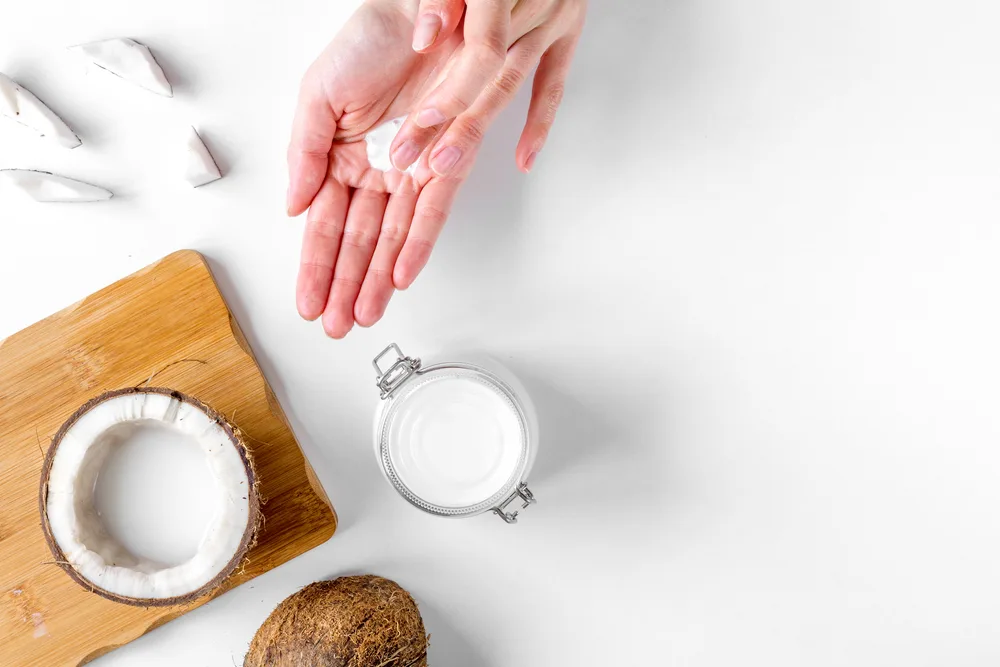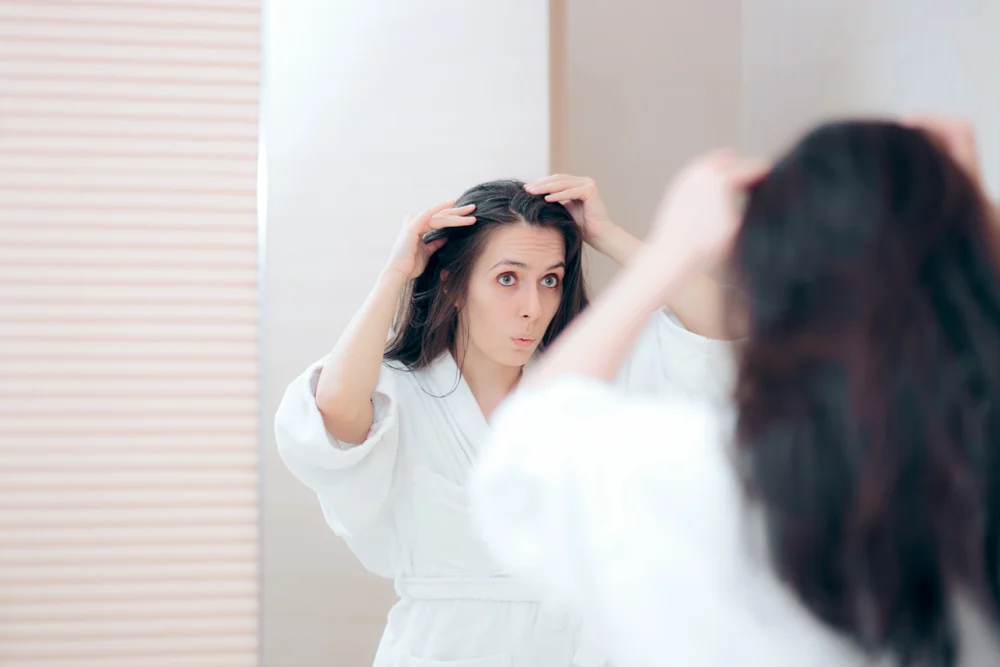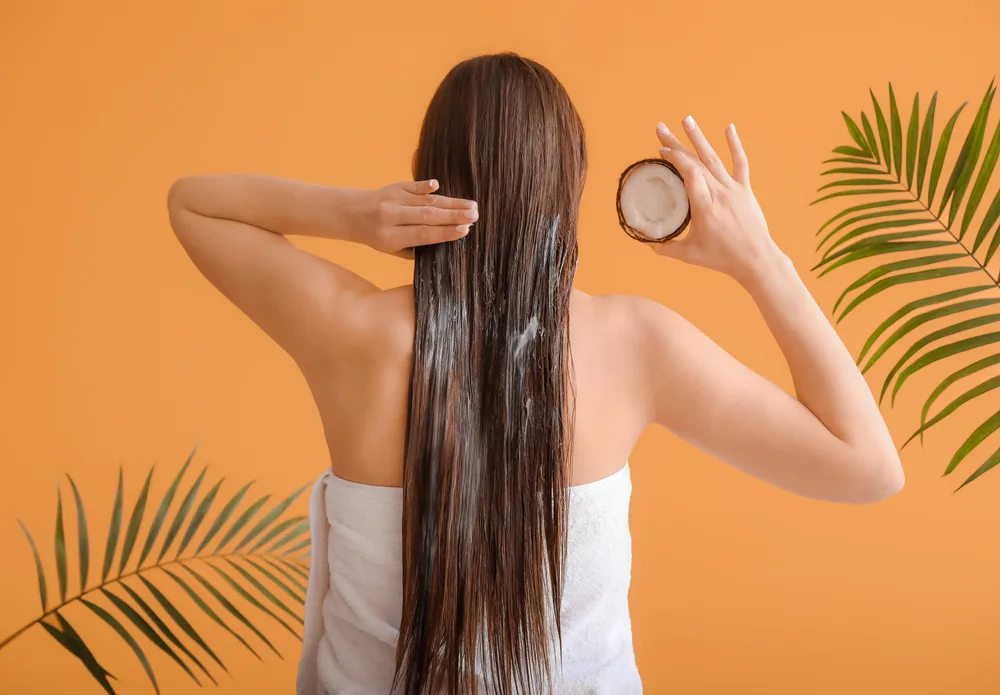Jump to:
Did you know you can use coconut oil for more than just cooking? Many people use it to soften their skin and hair, but does coconut oil remove hair dye? Read on to learn the answer and other effective tricks for fading hair dye.
Can Coconut Oil Remove Hair Dye?
Coconut oil won’t remove hair dye from your hair, but it will take the dye off your skin. If you’re looking to remove a box-dye disaster or don’t understand why your fancy salon dye looks dull, coconut oil might play a role.
You might wonder:
- Does coconut oil impact hair color?
- Are there alternatives?
- Does coconut oil benefit hair at all?
- What other factors cause fading hair dye?
We have the answers to these questions and more. Keep reading to understand how coconut oil impacts your hair, its benefits, and other methods for removing hair dye.
Read Next: Will Olive Oil Remove Permanent Hair Dye From Skin?
The Science Behind Coconut Oil
Coconut oil is made by compressing fresh or dried coconut meat (the white part inside the coconut). Some dermatologists and nutritionists recommend using coconut oil for its incredible benefits.
Coconut oil is extremely moisturizing because it contains two main components: fat content and fatty acids. Coconut oil is 100% fat, mostly saturated fat. This fattiness gives coconut oil qualities other oils don’t have.
For example, coconut oil stays solid at room temperature, unlike olive oil. Almost half of the fatty acids in coconut oil are lauric acid. When used topically, this gives coconut oil antibacterial properties.
Coconut Oil and Hair Dye
While coconut oil has some amazing health benefits, it does not remove hair dye from your hair. It does the opposite. Using coconut oil regularly in your hair can help reduce fading. Since coconut oil is so moisturizing, it coats and nourishes damaged hair, protecting the applied color.
Read Next: What Is the Best Oil for Hair?
Removing Hair Dye From Skin with Coconut Oil

279photo studio/Shutterstock
While coconut oil cannot remove hair color, it is effective at removing unwanted dye from your skin. If you’re dyeing your hair at home, prep the skin around your hairline with coconut oil.
The fat from the coconut oil creates a barrier between the dye and your skin. No more random color patches on your forehead! If you forget this step and obtain some skin stains, you can use coconut oil to lift the color.
Rub the impacted area with coconut oil. Then, soak the skin with warm soapy water for a few minutes. After some scrubbing, the dye should fade from the skin.
Benefits of Using Coconut Oil in Hair
Coconut oil might not remove hair dye, but it provides excellent benefits for your hair and scalp. Most coconut oil contains no extra ingredients, so it’s safe to use near more sensitive areas of the body like the face and scalp.
It’s also a great hair product for those with allergies or sensitive skin. If you suffer from skin and scalp irritations like psoriasis, coconut oil could provide some relief.
Coconut oil is also incredibly moisturizing for your hair because of its high fat content. Using coconut oil before shampooing is an efficient solution for rehydrating dry hair.
Other Methods of Removing Hair Dye From Your Hair
The most effective method for removing color from your hair is using a clarifying shampoo. Clarifying shampoos bring a deeper cleanse compared to regular shampoo formulas.
Hair specialists design robust formulas for clarifying shampoos to remove extra buildup from your scalp. Washing your hair with a clarifying shampoo soon after dyeing it will help remove some of the color. Much of the dye should fade after several washes.
This method works best if you use temporary or semi-permanent hair color. Of course, clarifying shampoo won’t remove all of the hair dye. Seeing a specialist at the salon is your best option to cover up or completely get rid of hair dye.
What Causes Faded Hair Dye?

Nicoleta Ionescu/Shutterstock
Now we’ve established that coconut oil does not remove or fade hair dye and how to remove hair color in a pinch. Still, if you’re trying to maintain your hair color, you might wonder why your dye dulls quickly. Let’s take a look at some of the most common causes of faded hair color below.
Poor Color Application
Your hair color application severely affects how long that color will last. Poor color application (either from a specialist or a DIY gone wrong) causes hair dye to fade faster.
The correct color application ensures the dye saturates every strand of hair and stays on long enough for your hair cuticles to absorb the color. Part of correct color application involves waiting to wash your hair.
If you wash your hair too soon after dyeing it, your hair may fade faster. Using sulfate-based shampoos dulls hair color, too. It’s best to wait at least three days after you dye your hair before the next wash.
Color Choice
Even if you take care of your hair, some dyes fade faster than others. Red shades like ginger, copper, and mahogany are most susceptible to color fading. Red hair dyes fade fast because the molecules that make up the dye are much larger than other colors.
Larger dye molecules have a difficult time penetrating through your hair cuticle. That’s why you notice it washing out faster than different colors.
Sun Damage
Time spent outside enjoying the sunshine may damage your hair more than you realize. UV damage from sun rays is a huge factor in dye loss. These pesky sun rays break down color and leave your hair vulnerable to split-ends, frizz, and breakage.
You might notice sun damage in various ways, including:
- Hair color fading
- Altered hair color
- Dull hair color
Too Much Water Exposure
Water quality and exposure play crucial roles related to your hair’s health. If you live in an area with hard water, your color will fade faster. If you’re someone who regularly dyes their hair, you might find it beneficial to invest in a water-softening shower head.
Excessive water exposure opens your hair cuticles and pulls the color out of your hair. Using sulfate-filled products on top of this only adds to the color fading risk.
Hair Damage
Damaged hair may also be the reason why your dye fades fast. Many factors damage hair such as:
- Chemical treatments from salons
- UV sun rays
- Heat styling from straighteners or curling irons
Damaged hair struggles to properly absorb pigments and dyes because of compromised hair cuticles.
Frequently Asked Questions

Pixel-Shot/Shutterstock
Below are answers to some commonly asked questions related to coconut oil and hair dye.
Do oils fade hair color?
Oils do not contribute to faded hair color. Coconut oils and other oils rehydrate the hair, protecting it from damage or fading.
Can coconut milk fade dyed hair?
Any coconut-based product like coconut milk will not fade dyed hair. Coconut products protect and nourish your hair because of their high-fat content.
Does coconut oil leave a white cast?
If you use too much coconut oil, it could leave oil buildup and a greasy feeling on your hair and scalp. Your hair may be more susceptible to coconut oil residue if it has a fine texture.
How long do you leave coconut oil on your hair?
For a hair mask or treatment, apply coconut oil to your hair while it’s still damp. Leave it on for up to 30 minutes before washing it out with shampoo and conditioner.
Do you apply coconut oil on wet or dry hair?
You can use coconut oil on wet or dry hair depending on its purpose. To tame a bit of frizz or flyaways, add a small amount to dry hair. As a moisturizing treatment, apply coconut oil to wet hair for better absorption.
So, Does Coconut Oil Remove Hair Dye?
While coconut oil is not effective at removing hair dye from your hair, it will remove dye from your skin. Additionally, it provides many benefits for maintaining a healthy head of hair. Regular application leads to hair that is hydrated, protected, and shiny.
